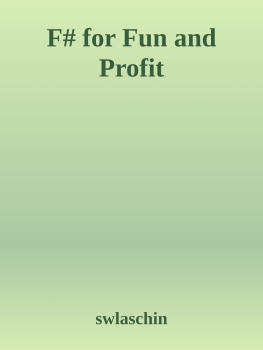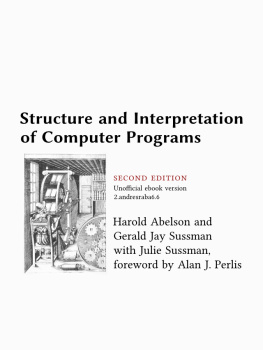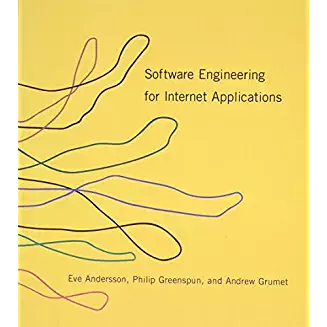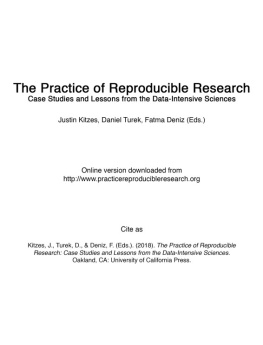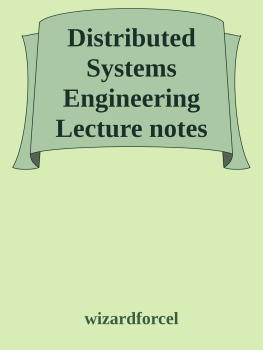it-ebooks - Functional Systems In Haskell Lecture Notes(Stanford CS240h)
Here you can read online it-ebooks - Functional Systems In Haskell Lecture Notes(Stanford CS240h) full text of the book (entire story) in english for free. Download pdf and epub, get meaning, cover and reviews about this ebook. year: 2017, publisher: iBooker it-ebooks, genre: Home and family. Description of the work, (preface) as well as reviews are available. Best literature library LitArk.com created for fans of good reading and offers a wide selection of genres:
Romance novel
Science fiction
Adventure
Detective
Science
History
Home and family
Prose
Art
Politics
Computer
Non-fiction
Religion
Business
Children
Humor
Choose a favorite category and find really read worthwhile books. Enjoy immersion in the world of imagination, feel the emotions of the characters or learn something new for yourself, make an fascinating discovery.

- Book:Functional Systems In Haskell Lecture Notes(Stanford CS240h)
- Author:
- Publisher:iBooker it-ebooks
- Genre:
- Year:2017
- Rating:5 / 5
- Favourites:Add to favourites
- Your mark:
- 100
- 1
- 2
- 3
- 4
- 5
Functional Systems In Haskell Lecture Notes(Stanford CS240h): summary, description and annotation
We offer to read an annotation, description, summary or preface (depends on what the author of the book "Functional Systems In Haskell Lecture Notes(Stanford CS240h)" wrote himself). If you haven't found the necessary information about the book — write in the comments, we will try to find it.
Functional Systems In Haskell Lecture Notes(Stanford CS240h) — read online for free the complete book (whole text) full work
Below is the text of the book, divided by pages. System saving the place of the last page read, allows you to conveniently read the book "Functional Systems In Haskell Lecture Notes(Stanford CS240h)" online for free, without having to search again every time where you left off. Put a bookmark, and you can go to the page where you finished reading at any time.
Font size:
Interval:
Bookmark:
From: CS240h lecture notes
- I'm David Mazires
- Spent most of my career working on OSes, Systems, and Security
- Previously used C++ and C, but started using Haskell 5 years ago
- Course partly inspired by my experience learning Haskell
- Other instructor: Bryan O'Sullivan
- Has implemented many key Haskell libraries in widespread use today
- Co-wrote Real World Haskell, a great non-theoretical intro book
- Also plenty of systems experience (e.g., Linux early userspace code)
- Course assistant: David Terei
- Member of the Haskell standards committee!
- Implemented Safe Haskell and GHC LLVM backend
- Haskell's expressive power can improve productivity
- Small language core provides big flexibility
- Code can be very concise, speeding development
- Get best of both worlds from compiled and interpreted languages
- Haskell makes code easier to understand and maintain
- Can dive into complex libraries and understand what the code is doing
(why may be a different story, but conciseness leaves room for comments...)
- Can dive into complex libraries and understand what the code is doing
- Haskell can increase the robustness of systems
- Strong typing catches many bugs at compile time
- Functional code permits better testing methodologies
- Can parallelize non-concurrent code without changing semantics
- Concurrent programming abstractions resistant to data races
- Haskell lets you realize new types of functionality (DIFC, STM, ...)
- Learn to build systems in Haskell with reduced upfront cost
- Historically, Haskell was a vehicle for language research.
The history is reflected in how the language is usually taught - CS240h will present the language more from a systems perspective
- Historically, Haskell was a vehicle for language research.
- Learn new, surprising, and effective programming techniques
- Some are applicable to other languages (though returning to other languages after Haskell can be frustrating)
- You enjoy programming
- With Haskell, you will think about programming in new ways
- You sometimes get frustrated with other languages
- Maybe you've wanted to design a new language, or tend to "max-out" existing language features (macros, templates, overloading, etc.)
- Things that require changes to most languages can be done in a library with Haskell
- We assume some of you may have toyed with Haskell, others not
- First week cover Haskell basics
- If you haven't used Haskell, you should supplement by reading parts of Bryan's book and/or on-line tutorials (such as http://www.haskell.org/tutorial/ or http://learnyouahaskell.com/chapters).
- If you have used Haskell, you may still learn some things from these lectures
- Rest of term covers more advanced techniques
- Final grade will be based on several factors
- Class attendance and participation -- bring your laptop to class
- Scribing one of the lectures -- need a volunteer for today
- We plan to collect all the notes and distribute them freely on web
- Three small warm-up solo programming exercises
- A large final project & presentation
- Implement a project of your choice in Haskell
- Projects may be done in teams of 1-3 people
- Meet with one of the instructors to discuss project
- Complete and evaluate project and turn in short paper
- Final exam will be mini-conference where you present your work
- Attending exam Tuesday, June 10th, 7:00pm-10:00pm is mandatory
But by unanimous consent we could move this to Thursday June 5, 12:15-3:15pm. (And we would serve lunch...)
- We encourage overlap of CS240h project with your research
- The programming techniques you learn in CS240h are likely orthogonal to whatever research you are doing
- We are okay with CS240h project also serving as another class project,
provided the other instructor and all teammates (from both classes) approve
- Install Haskell Platform or
cabal(sometimescabal-install) + GHC Create a file called
hello.hswith the following contents:main = putStrLn "Hello, world!"Compile your program to a native executable like this:
$ ghc --make hello [1 of 1] Compiling Main ( hello.hs, hello.o ) Linking hello ... $ ./hello Hello, world!Or run it in the GHCI interpreter like this:
$ ghci hello.hs GHCi, version 7.6.3: http://www.haskell.org/ghc/ :? for help ... Ok, modules loaded: Main. *Main> main Hello, world! *Main>
Haskell uses the
=sign to declare bindings:x = -- Two hyphens introduce a comment y = -- ...that continues to end of line. main = let z = x + y -- let introduces local bindings in print z -- program will print 5- Bound names cannot start with upper-case letters
- Bindings are separated by "
;", which is usually auto-inserted by a layout rule
- A binding may declare a function of one or more arguments
- Function and arguments are separated by spaces (when defining or invoking)
add arg1 arg2 = arg1 + arg2 -- defines function add five = add -- invokes function add Parentheses can wrap compound expressions, must do so for arguments
bad = print add -- error! (print should have only 1 argument)main = print (add ) -- ok, calls print with 1 argument, 5
- Unlike variables in imperative languages, Haskell bindings are
- immutable - can only bind a symbol once in a give scope (bound symbols still called "variables" since function arguments can vary across invocations)
x = x = -- error, cannot re-bind x- order-independent - order of bindings in source code does not matter
- lazy - definitions of symbols are evaluated only when needed
safeDiv x y = let q = div x y -- safe as q never evaluated if y == 0 in if y == then else q main = print (safeDiv ) -- prints 0- recursive - the bound symbol is in scope within its own definition
x = -- this x is not used in main main = let x = x + -- introduces new x, defined in terms of itself in print x -- program "diverges" (i.e., loops forever)
In C, we use mutable variables to create loops:
long factorial ( int n) { long result = ; while (n > ) result *= n--; return result; }In Haskell, use recursion to "re-bind" argument symbols in new scope
factorial n = if n > then n * factorial (n - ) else- Recursion often fills a similar need to mutable variables
- But the above Haskell factorial is inferior to the C one--why?
- Each recursive call may require a stack frame
This Haskell code requires
nstack framesfactorial n = if n > then n * factorial (n - ) else- By contrast, our C factorial ran in constant space
Font size:
Interval:
Bookmark:
Similar books «Functional Systems In Haskell Lecture Notes(Stanford CS240h)»
Look at similar books to Functional Systems In Haskell Lecture Notes(Stanford CS240h). We have selected literature similar in name and meaning in the hope of providing readers with more options to find new, interesting, not yet read works.
Discussion, reviews of the book Functional Systems In Haskell Lecture Notes(Stanford CS240h) and just readers' own opinions. Leave your comments, write what you think about the work, its meaning or the main characters. Specify what exactly you liked and what you didn't like, and why you think so.

